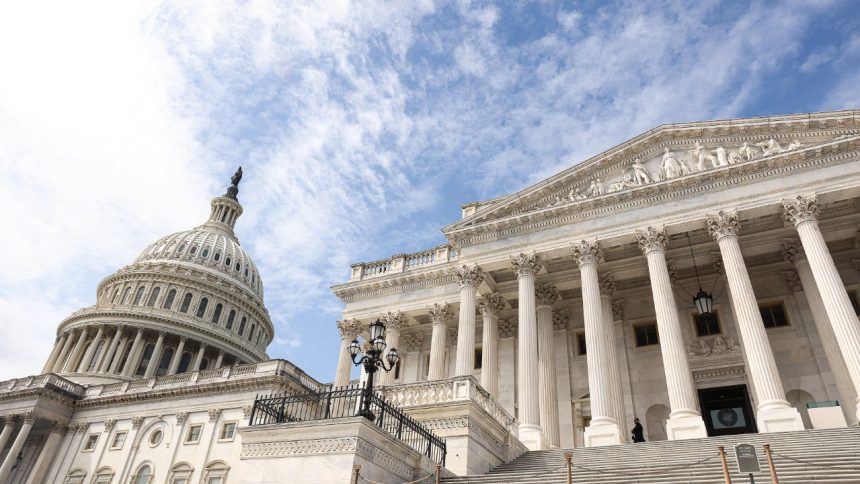If you’re deep in debt — or concerned that lingering inflation, the U.S. trade war or a potential recession could land you there — you might not be looking to Washington, D.C., for help. Turn on the news, and it’s hard to see anyone agreeing on anything, let alone substantive consumer debt solutions.
And yet, there might be more common ground than you think.
Bankrate requested interviews from 17 members of Congress, including those who serve on the House’s Committees on Education & Workforce and Financial Services as well as the Senate’s Committee on Banking, Housing and Urban Affairs. These efforts led to separate interviews with two House members from different coasts and political parties: 18-term Rep. Maxine Waters (D-CA) and two-term Rep. Mike Lawler (R-NY).
Sure, Reps. Waters and Lawler shared party-aligned talking points — namely, that the Trump Administration is doing major damage to democracy (Democrat) and is just beginning to implement its electorally-mandated agenda (Republican). And yes, they’re just two voices of many. But if you accept them as proxies, at least for their chamber, these House members also proved that the only side to choose in the debate of consumer debt is the consumer’s.
Both told us they realize that consumer confidence is reaching COVID-19-era lows and financial literacy isn’t budging. Believe it or not, they also, at least partly, agree on what levers they can pull to help their constituents get out of the red and off the sidelines.
Does D.C. understand today’s burden on consumers?
They at least grasp the frustration. During our conversation, Lawler relayed one of his constituents’ chief concerns: elevated interest rates triggering higher mortgage payments (about $1,000 per month higher in his district, according to his claims).
“That’s unsustainable for most people,” says Lawler. “People need to be able to afford everyday necessities and be able to afford where they live. So, this is still the biggest issue we’re dealing with.”
“Look, the taxes are too high. Utility costs are too high. Housing costs are too high. Grocery costs are too high. Everybody’s paying through the nose, and we have to bring it down.”
— Rep. Mike Lawler (R-NY)
As for Waters, she tells Bankrate her party is “very much keenly aware and feeling what is going on” regarding Americans’ personal financial frustrations.
“We’re holding town hall meetings to try and help people to understand what is going on with the new administration and what we’re trying to do,” she says. “We continue to produce legislation because this legislation defines us and helps people to know what we care about, no matter if it’s a chaotic situation. Everybody should be concerned. What is happening in this country is more than serious.”
| Non-mortgage consumer debt | Total* | Annual increase |
| Auto loans | $1.66 trillion | $48 billion |
| Student loans | $1.62 trillion | $14 billion |
| Credit cards | $1.21 trillion | $82 billion |
| *As of the fourth quarter of 2024 | ||
4 levers that Congress can pull to help consumers
1. Legislating
If you think of another point in recent history where managing your personal finances was more complicated, you might come up with the Great Recession of 2008 or the COVID-19 pandemic. In both cases, the government stepped in in the form of bailouts for companies or stimulus checks for consumers, targeted student loan forgiveness for borrowers and the Paycheck Protection Program for small business operators, among other relief.
As Lawler told Bankrate for our student loan legislation tracker: “Legislating takes time.” The question is whether it can be proactive enough to outrun the next, perhaps broader consumer finance crisis (if we’re not in one already).
Lawler points to the ongoing budget reconciliation process, which Republicans hope will decrease taxes and reshape student loan repayment, among other staples. Through reconciliation, the Republican-controlled Congress might avoid relying on Democratic support — if the chambers’ nonpartisan parliamentarian deems the legislation to genuinely be budget-related. Otherwise, Republicans will either need to pare back their ambitions or start reaching across the aisle.
Reality check
In Congress’s current state — Republicans holding slim majorities in both chambers — it seems unlikely that meaningful bipartisan legislation is in the offing.
2. Protecting the CFPB
When Waters, 86, joined Congress in 1991, the Consumer Financial Protection Bureau (CFPB) was still two decades from its founding. The CFPB was another byproduct of post-calamity legislation: It was established by the Dodd-Frank Act in the Great Recession’s wake.
In its first 15 years of operations, the CFPB has advocated for credit card users and fined lenders and loan servicers, including infamous cases involving Navient (student loans) and Wells Fargo (auto and home loans).
However, the Trump Administration’s attempts to dismantle the CFPB in its first 100 days in office have threatened its consumer protection efforts.
“Since they’ve been in operation, they’ve done a great job returning billions of dollars to consumers,” says Waters. “And so I’m hoping that with the court decision, they’re able to go back to work.”
Lawler says the CFPB (like many agencies) can be reformed, but agrees with the valuable role it plays in staving off consumer harms.
“The CFPB can be and should be helpful and focused on protecting consumers from incurring the levels of debt that many have and doing more to help educate within our communities,” he says.
Reality check
The embattled and diminished agency remains in something of a legal limbo. On the bright side, many experts say the CFPB isn’t going anywhere without Congress’ say-so.
3. Funding financial education
While the Trump Administration’s overhauling of the Department of Education is part of a larger desire to to hold colleges and their leaders accountable, there’s lower-hanging fruit to boost financial literacy: How about adding personal finance courses to curriculums nationwide? Consider the fact that Financial Industry Regulatory Authority’s literacy quiz reports a national average score of 3.3 out of 7.
As Lawler says, it could be about thinking of students as “on a path to career readiness, not just college readiness.” You might add “life readiness” to that line, too.
“One of the challenges that we see within our education system is there’s, at times, a lack of financial literacy. And that’s something that we really have to take more seriously and make sure that people fully understand what it is that they are taking on — whether it’s through a mortgage, car loans, student loans, credit card bills — that they understand the level of debt that they’re carrying and how much they pay over time.”
In her district, Waters says she views enrollment as a more pressing issue than — and perhaps a critical prequel to — designing personal finance curriculums. She described to Bankrate a meeting with community college students who were concerned about their ability to stay in school.
“’Now is not the time to drop out, that even though Pell Grants and all of that is in danger, keep doing everything you can to comply,’” Waters recalls telling the students. “Because education, in the final analysis, is the future of our country.”
Reality check
In January, a House Democrat introduced the Young Americans Financial Literacy Act, but you might not have to wait on Washington for this one. State governments are increasingly encouraging or even requiring high schools to administer personal finance courses, according to The American Public Education Foundation’s tracking.
4. Leaving room for personal responsibility
You might not look to the halls of Congress for personal finance advice, per se, but that doesn’t mean it won’t be offered to you. Without wanting to sound preachy, Lawler tells his constituents to “stay on top” of their finances to “make sure that your debt is paid off.”
“Unlike the federal government,” he adds with a chuckle, “you don’t get to just print new money.”
So, in a sense, Washington asks you to do something it can’t. This pull-yourself-up-by-the-boostraps mentality is shared by Lawler, Waters and no doubt many other elected officials.
“I come from a large family, and we learned to do whatever was necessary in order to survive. And so we worked at all kind[s] of odd jobs when we were teenagers coming up… And so I always say to people… ‘Take a job you may not like, consider it temporary until you can do better. Do what you have to do in order to survive.'”
— Rep. Maxine Waters (D-CA)
And they’re not wrong. Of course it’s helpful to be an active participant in your personal finances. In fact, it’s the most immediately useful lever (of the four) to pull because you don’t need an act of Congress to do it.
Reality check
This is all easier said than done, especially if you’ve lost a job, have medical bills, credit cards or other debt to repay. In case it helps, consider Bankrate guides on everything from debt repayment strategies to building good money habits and beyond. For more urgent needs, consider dialing 211 to tap local resources.
Read the full article here















